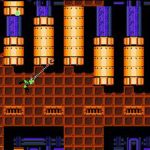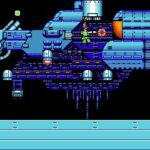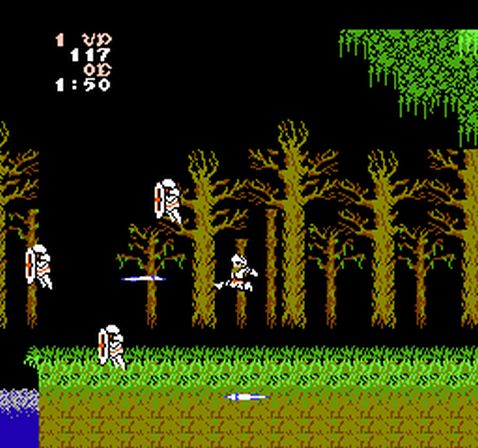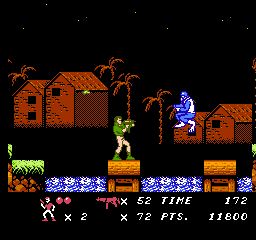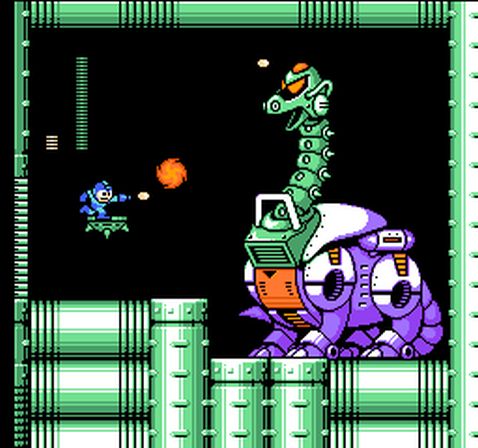Developer: Capcom Publisher: Capcom Released: 12/88 Genre: Action
To anyone who had the misfortune of playing the original Bionic Commando arcade game, I am sorry. While the germ of a good idea was there the sloppy execution was its downfall. To put it simply, the game was bad. But someone at Capcom had the foresight to give it another chance and craft the NES version of Bionic Commando. In the process one of the best games for the system was made. Even after nearly 30 years the game is still great and every bit the classic you remember.
In the year 198X the Federation and the Empire are at war. One day the Federation discover secret documents outlining a project “Albatross”, an unfinished plan by the Empire’s predecessor the Badds. Empire leader Generalissimo Kilt revives the project and Super Joe is sent to stop him. Unfortunately Super Joe is captured and Ladd Spencer is sent to rescue him using an experimental Bionic arm.
The story factors into the game heavily throughout the adventure. You can learn more about the plot in the communication rooms in every level as well as the neutral zones. You can even learn confidential information by wiretapping however that carries a risk. It is pretty funny how badly Capcom try to hide the fact that the Badds were actually Nazis. Even I was able to put two and two together and I was nine when I played this!
The first thing you will need to accept is that you cannot jump. At all. All means of traversal uses your bionic arm. This mechanic is the game’s lifeblood and thankfully it is perfectly executed. The arm has long reach and you must master swing timing and momentum as well as stopping on a dime. It can be very easy to accidentally release and fall when you meant to climb up a platform. Even now it takes some practice but eventually it becomes second nature.
Or at least it has to. There really is no getting around it: Bionic Commando has one of the steepest learning curves of any Nintendo title. The game throws you to the wolves immediately and does not hold your hand. I distinctly remember my first experience with the game. It involved falling to my death repeatedly and it was frankly embarrassing. About three levels in the game expects expertise as it becomes more complex and only gets worse. Area 8 is the biggest skill check and if you cannot make it there give up. That more than anything is probably why many give up on it. I have no doubts that the game would have found an audience regardless but you can’t deny that it did benefit from releasing early in the system’s life.
Those that stick with it will find one of the system’s best games as the level design is fantastic. The grappling mechanic is incredibly satisfying to use as it can latch onto any surface. You can grab a barrel and pull yourself forward, pick up items from a distance and swing like Tarzan in stylish fashion. The stages are creative in their design too. Area 2 features slime that drags you and while normally this isn’t an issue in most games here it’s terrifying. Later levels even make use of this mechanic for progression. Area 5 is a vertical ascent as troops parachute from the sky and laser beams shut down your arm. The areas in the second half of the map become maze like and confusing to navigate, presenting an appropriate challenge for conclusion.
The game’s setup is different than normal. The world map has 19 zones of which the first twelve are action stages. The last 6 are neutral areas where combat is prohibited. In these areas you will find items, weapons, and people necessary to progress. To a certain extent the game is nonlinear. You can tackle levels in any order although certain stages are blocked until specific criteria are met. These are areas 8 and 12 (the game’s final level). In the midst of all this activity are trucks that lead to brief overhead segments where you can earn continues.
It is very RPG like and that connection goes even further. You begin with no hit points but “level” up by collecting bullets, eventually reaching a max of 8. Prior to every level you can select four pieces of equipment; a weapon, item, accessory, and communicator. The most important of these is the communicator as it is necessary to open the boss doors. Nothing is more frustrating than clearing 75% of a level only to realize you brought the wrong communicator and have to do it all over again.
I can breeze through it in about an hour now but it was a long process to reach this point. I still feel Bionic Commando could have used passwords to save progress. This is a long game by NES standards. Later levels featuring such little margin for error that it is soul crushing to fail and start over. Granted that is part of the learning process. But some means of saving progress would have made the game less off putting.
In Closing
Bionic Commando is a classic within the NES library and deserving of that status. The difficulty is steep but is completely worth it to experience one of the most unique games for the system. This is easily one of the best games on the platform and a must buy.



